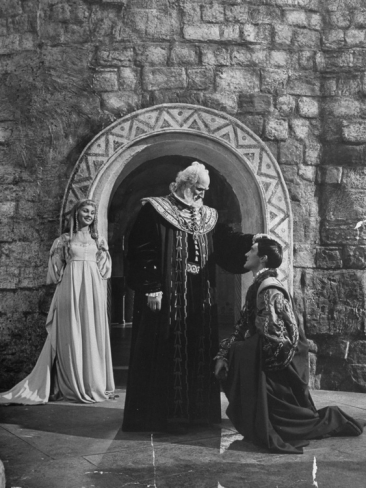Discussing with a client and friend the fact that he had lent a large amount of money to his cousin and was having difficulty in getting it back, I quoted Shakespeare: “Neither a borrower nor a lender be.”
That inspired me later to seek a modern day translation of Polonius’s advice to Laertes from the play Hamlet, which contains the above quotation.
(Btw, the motto of my high school was “To thine own self be true”.)
Polonius’s speech, in Shakespearian language, is:
And these few precepts in thy memory
See thou character. Give thy thoughts no tongue,
Nor any unproportioned thought his act.
Be thou familiar, but by no means vulgar.
Those friends thou hast, and their adoption tried,
Grapple them to thy soul with hoops of steel;
But do not dull thy palm with entertainment
Of each new-hatch'd, unfledged comrade. Beware
Of entrance to a quarrel, but being in,
Bear't that the opposed may beware of thee.
Give every man thy ear, but few thy voice;
Take each man's censure, but reserve thy judgment.
Costly thy habit as thy purse can buy,
But not express'd in fancy; rich, not gaudy;
For the apparel oft proclaims the man,
And they in France of the best rank and station
Are of a most select and generous chief in that.
Neither a borrower nor a lender be;
For loan oft loses both itself and friend,
And borrowing dulls the edge of husbandry.
This above all: to thine ownself be true,
And it must follow, as the night the day,
Thou canst not then be false to any man.
There is some good advice there but, at the same time, there are aspects which reveal some of the character of the speaker.
I came across the following translation and commentary at
Whenever you look at anything Polonius says you need to remember that he is very old, and is starting to get a little rambly. Quite often he starts saying something, loses his place, and then can't pick it up again. (Maybe you even know a teacher like that).
Lines 59-60
Give thy thoughts no tongue, Nor any unproportioned thought his act.
Don't let on to what you are thinking too easily. Never take action on anything you haven't thought through properly. (Polonius breaks both of these all through the play - in fact he gets himself killed for breaking the second piece of advice).
Line 61
Be thou familiar, but by no means vulgar.
Make friends easily, but don't slum it as a way of making yourself popular.
Lines 62-65
Those friends thou hast, and their adoption tried, Grapple them to thy soul with hoops of steel; But do not dull thy palm with entertainment Of each new-hatch’d, unfledged comrade.
When you have a good friend, stick fast to him. But don't go out of your way to get friendly with any old John off the street.
Lines 65-69
Beware Off entrance to a quarrel, but being in, Bear’t that the opposed may beware of thee.
Try to stay out of fights, but if you find yourself in one - make sure that you keep the guy you are fighting afraid of you.
Give every man thy ear, but few thy voice;
Listen to everyone, but be choosy over who you agree with.
Take each man’s censure, but reserve thy judgment
Always listen when people criticise you, but don't be too quick to criticise other people.
Lines 70-74
Costly thy habit as thy purse can buy, But not express’d in fancy; rich, not gaudy; For the apparel oft proclaims the man, And they in France of the best rank and station Are of a most select and generous chief in that.
Buy the best quality clothing you can afford - because people often judge you by what you are wearing. But spend your money on quality, not just on being flash. Remember that the French pay a lot of attention to how you dress (Laertes is going to France).
Lines 75-77
Neither a borrower nor a lender be; For loan oft loses both itself and friend, And borrowing dulls the edge of husbandry.
Don't lend people money: you won't get your money back, and you will probably quarrel with the person you lent it to. Don't borrow money either, learn to manage your own.
Lines 78-80
This above all: to thine ownself be true, And it must follow, as the night the day, Thou canst not then be false to any man.
Always be who you are; if you are who you are, then obviously everybody else can trust you to.
(Coming from Polonius - the most two-faced character in the play - this piece of advice is hilarious).
Here is another version:
Try to remember a few rules of life.
Don’t say what you’re thinking, and don’t be too quick to act on what you think.
Be friendly to people but don’t overdo it.
Once you’ve tested out your friends and found them trustworthy, hold onto them. But don’t waste your time shaking hands with every new guy you meet.
Don’t be quick to pick a fight, but once you’re in one, hold your own.
Listen to many people, but talk to few.
Hear everyone’s opinion, but reserve your judgment.
Spend all you can afford on clothes, but make sure they’re quality, not flashy, since clothes make the man—which is doubly true in France.
Don’t borrow money and don’t lend it, since when you lend to a friend, you often lose the friendship as well as the money, and borrowing turns a person into a spendthrift.
And, above all, be true to yourself. Then you won’t be false to anybody else






No comments:
Post a Comment
Note: Only a member of this blog may post a comment.